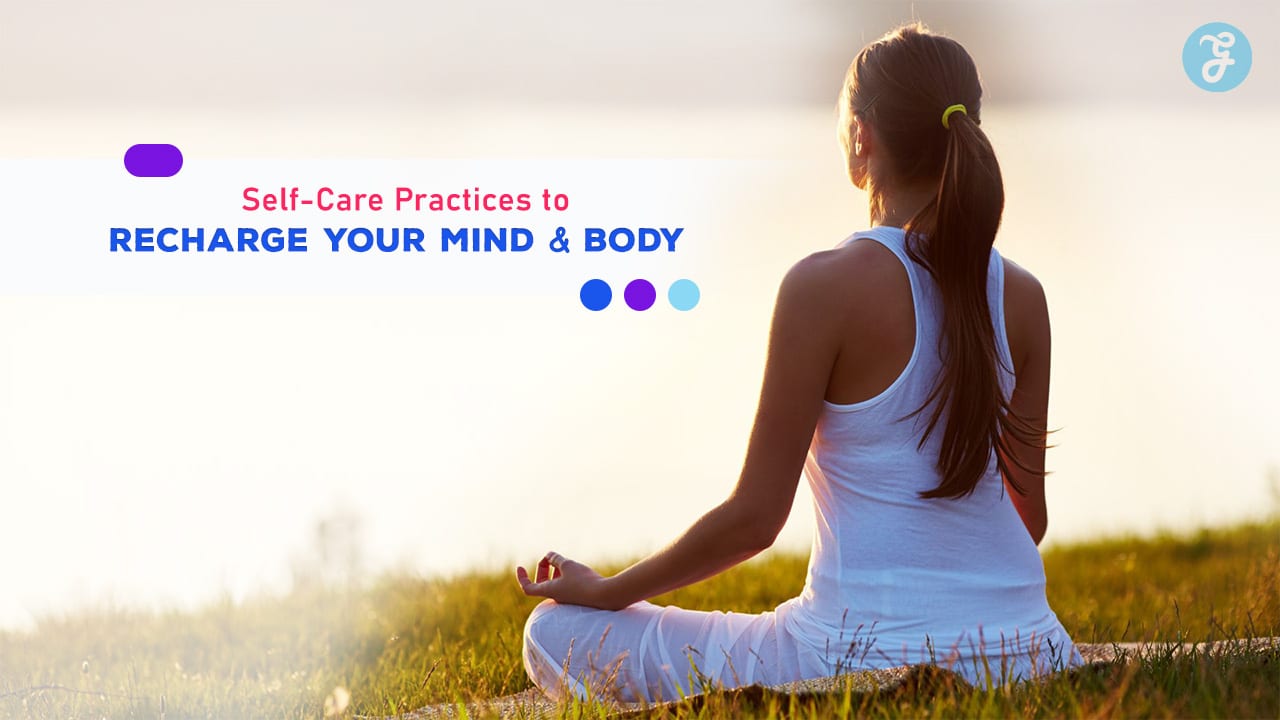In today’s fast-paced and ever-connected world, maintaining mental and physical well-being can feel like a challenge.
We often juggle demanding workloads, personal responsibilities, and social commitments, leaving little time to focus on ourselves.
Yet, taking time to care for your body and mind isn’t just a luxury—it’s essential for overall health and happiness.
Engaging in self-care practices can help recharge your energy, reduce stress , and restore a sense of balance in life.
Below are 12 detailed self-care practices that can help you rejuvenate your mind and body.
1. Practice Mindful Meditation
Mindful meditation is one of the most effective self-care practices to recharge your mental energy.
Mindfulness is the art of paying attention to the present moment without judgment.
By practicing mindful meditation , you can reduce stress, enhance your concentration, and improve emotional stability.
It also allows you to observe your thoughts, feelings, and physical sensations in a non-reactive way, helping you cultivate peace and self-awareness.
How to Get Started:
- Set aside time :
Start with as little as five to ten minutes each day. Gradually increase this time as you become more comfortable.
- Find a quiet space :
Sit in a comfortable position where you won’t be disturbed.
You can sit on a cushion, a chair, or on the floor—whatever feels best for you.
- Focus on your breath :
Close your eyes and bring your attention to your breath.
Observe the rise and fall of your chest or the feeling of air flowing in and out of your nostrils.
- Acknowledge thoughts :
When your mind inevitably wanders, gently bring your focus back to your breath.
Avoid judging yourself for drifting off.
Benefits:
- Reduces stress and anxiety :
Mindfulness has been shown to reduce the production of cortisol, the stress hormone, leading to a calmer state of mind.
- Improves emotional resilience :
Regular meditation helps you better manage your emotions, making you less reactive to negative thoughts or external pressures.
- Enhances focus and mental clarity :
By training your brain to focus, meditation can improve attention span and mental acuity over time.
2. Prioritize Quality Sleep
Sleep is one of the most powerful ways to recharge your mind and body. Quality sleep allows your body to recover and repair itself, while your brain processes and organizes information from the day. Without adequate rest, your physical health suffers, and your mental clarity, emotional balance, and energy levels deteriorate.
How to Improve Sleep Quality:
- Create a sleep routine :
Establish a consistent sleep schedule by going to bed and waking up at the same time each day, even on weekends.
This helps regulate your body’s internal clock.
- Wind down before bed :
Incorporate a relaxing pre-sleep routine, such as reading a book, practicing light stretches, or listening to soothing music.
Avoid stimulating activities like watching TV or using your phone right before bed.
- Optimize your sleep environment :
Make your bedroom conducive to sleep by keeping it dark, cool, and quiet. Invest in a comfortable mattress and pillows that support your body.
- Limit caffeine and heavy meals :
Avoid consuming caffeine or heavy meals too close to bedtime, as they can interfere with your ability to fall asleep .
Benefits:
- Boosts cognitive function :
Quality sleep improves memory , concentration, and problem-solving abilities.
- Regulates mood :
Adequate sleep helps balance hormones like serotonin and dopamine, reducing irritability and promoting emotional well-being.
- Strengthens the immune system :
Sleep supports the body’s ability to fight infections and repair tissues, contributing to overall physical health.
3. Exercise Regularly
Exercise is not only vital for maintaining physical fitness but it is also one of the best ways to improve mental well-being.
Physical activity releases endorphins, chemicals in the brain that act as natural painkillers and mood elevators.
Regular exercise can reduce symptoms of depression and anxiety, increase energy levels, and improve sleep quality.
How to Incorporate Exercise:
- Choose enjoyable activities :
Whether you enjoy running, yoga, swimming, dancing, or hiking, find a form of exercise that you love.
Enjoyment makes it easier to stay consistent.
- Start slow and build up :
If you’re new to exercise, start with simple activities like walking or stretching, and gradually increase the intensity as your fitness improves.
- Combine cardio and strength :
For balanced fitness, aim for a mix of cardiovascular exercise (like walking, cycling, or jogging) and strength training (such as lifting weights or using resistance bands).
- Stay consistent :
Aim for at least 30 minutes of moderate exercise five days a week.
Even shorter bursts of activity, such as a brisk 10-minute walk, can offer significant benefits.
Benefits:
- Enhances mood :
Exercise increases the production of endorphins and serotonin, which boost happiness and reduce feelings of stress.
- Increases energy and reduces fatigue :
Regular physical activity improves cardiovascular health, making your body more efficient at delivering oxygen and nutrients to your tissues, which leads to increased energy.
- Supports brain health :
Exercise improves blood flow to the brain, stimulating the growth of new neurons and enhancing cognitive function.
4. Practice Gratitude
Gratitude is a powerful practice that can transform your mindset and enhance your mental well-being.
By focusing on what you’re grateful for, you can shift your attention away from negative thoughts and develop a greater appreciation for the positive aspects of your life.
Gratitude has been shown to improve happiness, foster emotional resilience, and strengthen relationships.
How to Practice Gratitude:
- Keep a gratitude journal :
Each day, write down three things you are grateful for.
These can be as simple as a sunny day, a kind word from a friend, or a delicious meal.
- Express gratitude to others :
Take time to acknowledge and thank the people who bring positivity into your life.
Whether it’s a handwritten note, a heartfelt message , or verbal appreciation, expressing gratitude strengthens obligations.
- Reflect during challenging times :
Even in difficult moments, there’s often something to be grateful for.
Reflect on the lessons learned or the support you received during tough times.
Benefits:
- Boosts happiness and life satisfaction :
Gratitude shifts your focus to the positive, leading to increased feelings of contentment and joy.
- Reduces stress and negative emotions :
Practicing gratitude lowers cortisol levels and can help alleviate feelings of anxiety and depression.
- Improves relationships :
Expressing gratitude fosters stronger social connections and enhances feelings of trust and appreciation in relationships.
5. Unplug from Technology
In an age of constant connectivity, it’s easy to feel overwhelmed by the demands of technology.
From social media to emails and notifications, being “always on” can lead to mental fatigue, anxiety, and burnout.
Unplugging from technology allows you to mentally recharge, refocus, and be present in the moment.
How to Unplug:
- Set digital boundaries :
Designate specific times during the day to be free from screens.
For instance, avoid checking your phone during meals, or commit to a screen-free hour before bedtime.
- Take a digital detox :
Spend a day, weekend, or even a week away from social media, email, and other digital distractions.
Use this time to reconnect with nature, read a book, or spend quality time with loved ones.
- Turn off notifications :
Reduce the constant barrage of alerts by turning off non-essential notifications on your devices.
This can help minimize distractions and allow you to focus on the present.
Benefits:
- Reduces mental fatigue :
Constant screen time can overstimulate the brain, leading to exhaustion and irritability.
Taking breaks from technology gives your mind the rest it needs.
- Improves sleep quality :
Limiting screen time, particularly before bed, can improve sleep by reducing exposure to blue light , which interferes with the production of the sleep hormone melatonin.
- Promotes mindfulness and presence :
Unplugging allows you to be more present in the moment, improving focus and engagement in everyday activities.
6. Nourish Your Body with Healthy Food
What you eat has a direct impact on both your physical and mental well-being .
Nourishing your body with nutrient-dense foods can boost your energy, enhance mood, and improve cognitive function.
A healthy diet supports your body’s ability to function at its best while also protecting against chronic illnesses.
How to Nourish Your Body:
- Eat a balanced diet :
Include a variety of fruits, vegetables, whole grains, lean proteins, and healthy fats in your meals.
A diverse diet ensures you’re getting the nutrients your body needs to thrive.
- Stay hydrated :
Drink plenty of water throughout the day to keep your body hydrated and your mind alert.
Dehydration can lead to fatigue, headaches, and difficulty concentrating.
- Limit processed foods :
Highly processed foods, which are often high in sugar, salt, and unhealthy fats, can cause energy crashes and negatively affect your mood.
Focus on whole, natural foods that nourish your body.
- Listen to your body :
Eat when you’re hungry, and stop when you’re full.
Paying attention to your body’s hunger cues helps you maintain a healthy relationship with food.
Benefits:
- Increases energy levels :
A balanced diet provides your body with the nutrients it needs to maintain steady energy throughout the day.
- Supports brain health :
Foods rich in antioxidants, omega-3 fatty acids, and vitamins (like berries, fish, and leafy greens) can enhance cognitive function and protect against mental decline.
- Boosts mood and reduces anxiety :
Certain nutrients, such as magnesium, vitamin D, and omega-3s, play a key role in regulating mood and promoting mental well-being.
7. Engage in Creative Hobbies
Engaging in creative activities is a wonderful way to relax, de-stress, and recharge mentally.
Whether it’s painting, writing, crafting, playing music , or cooking, creative hobbies provide an outlet for self-expression and allow you to tap into a different part of your brain.
Creative endeavors can also be a meditative practice, helping you focus on the process rather than the outcome.
How to Make Time for Hobbies:
- Schedule creative time :
Set aside time in your weekly schedule for hobbies, just as you would for work or appointments.
Treat this time as a priority for your mental well-being.
- Try something new :
Don’t be afraid to explore new hobbies or creative outlets.
Whether it’s photography, pottery, or journaling, experimenting with different activities can spark your creativity and keep things fresh.
- Focus on the process :
When engaging in creative activities, focus on the joy of the process rather than the end result.
Let go of perfectionism and embrace creativity as a way to relax and recharge.
Benefits:
- Reduces stress and anxiety :
Engaging in creative activities can shift your focus away from stressors and help you relax.
- Increases self-confidence :
Completing a creative project, no matter how small, can boost your confidence and provide a sense of accomplishment.
- Promotes mental clarity :
Creative expression allows you to process emotions and thoughts in a non-verbal way, leading to greater mental clarity and insight.
8. Practice Deep Breathing Exercises
Deep breathing exercises are a quick and effective way to reduce stress, calm your mind, and bring yourself back into balance.
Intentional breathing engages your parasympathetic nervous system, which signals your body to relax.
This practice can help lower your heart rate, reduce anxiety, and improve your ability to focus.
How to Practice Deep Breathing:
- Find a quiet place :
Sit or lie down in a comfortable position in a peaceful environment.
- Inhale deeply :
Take a slow, deep breath in through your nose for a count of four, feeling your chest and abdomen rise as you fill your lungs.
- Hold your breath :
Hold the breath for a count of four.
- Exhale slowly :
Gently exhale through your mouth for a count of four, releasing all the air from your lungs.
- Repeat :
Continue this cycle for several minutes, focusing on the sensation of your breath.
Benefits:
- Reduces stress and anxiety :
Deep breathing activates your body’s relaxation response, lowering levels of stress hormones and reducing anxiety.
- Improves focus and concentration :
By focusing on your breath, you can calm mental chatter and enhance your ability to concentrate.
- Supports cardiovascular health :
Regular deep breathing can lower blood pressure and improve overall heart health.
9. Spend Time in Nature
There’s a reason why spending time outdoors can feel so rejuvenating. Nature has a unique ability to calm the mind and refresh the body.
Whether it’s taking a walk in the park, hiking in the mountains, or simply sitting by the beach, being in nature helps reduce stress, improve mood, and boost energy levels.
How to Spend Time in Nature:
- Take daily walks :
Incorporate short walks into your daily routine.
Even a 10-15 minute stroll in a nearby park can improve your mood and mental clarity.
- Engage in outdoor activities :
Plan outdoor activities that allow you to be active, such as hiking, cycling, or gardening.
Not only will this get you moving, but it also provides the added benefits of fresh air and sunlight.
- Observe your surroundings :
When you’re in nature, take a moment to appreciate your surroundings.
Pay attention to the sounds, smells, and sights around you—whether it’s the rustling of leaves, the sound of birds, or the feel of the wind on your skin.
Benefits:
- Reduces stress and anxiety :
Time in nature lowers cortisol levels and promotes relaxation.
- Boosts mood and mental clarity :
Natural environments have been shown to improve mental well-being, increase focus, and reduce symptoms of depression.
- Increases physical activity :
Outdoor activities often involve movement, which boosts physical health and energy levels.
10. Set Healthy Boundaries
Setting boundaries is a crucial aspect of self-care, allowing you to protect your time, energy, and emotional well-being.
Without boundaries, it’s easy to feel overwhelmed, overworked, or taken advantage of, leading to burnout and stress.
Establishing healthy boundaries means knowing when to say no and prioritizing what’s most important to you.
How to Set Boundaries:
- Communicate clearly :
When setting boundaries with others, be clear and assertive about your needs.
For example, if you need time for yourself, kindly but firmly express this to those around you.
- Learn to say no :
It’s okay to decline requests that don’t align with your priorities or that would overwhelm you.
Saying no is an important part of self-care.
- Recognize your limits :
Be mindful of how much you can realistically handle.
When you feel stretched too thin, take a step back and reevaluate your commitments.
Benefits:
- Prevents burnout :
Setting boundaries helps you avoid overcommitting, leading to greater balance and less stress.
- Enhances relationships :
Boundaries foster respect in relationships, ensuring that your needs are recognized and honored.
- Improves emotional well-being :
By protecting your time and energy, you can focus on activities that bring you joy and fulfillment.
11. Practice Self-Compassion
Self-compassion involves treating yourself with kindness, understanding, and care, especially during times of difficulty.
Rather than being overly critical or harsh, self-compassion encourages you to acknowledge your imperfections with empathy.
Practicing self-compassion helps you develop a healthier relationship with yourself and fosters emotional resilience.
How to Practice Self-Compassion:
- Treat yourself like a friend :
When you’re going through a difficult time or make a mistake, imagine how you would comfort a close friend in the same situation.
Offer yourself the same kindness and understanding.
- Practice positive self-talk :
Replace negative self-talk with compassionate, uplifting words.
Instead of berating yourself for a mistake, acknowledge that everyone makes mistakes and focus on what you can learn.
- Acknowledge your humanity :
Remind yourself that imperfection is part of being human.
Recognizing that everyone experiences setbacks can help you feel less isolated in your struggles.
Benefits:
- Reduces self-criticism :
Self-compassion helps reduce harsh self-judgment, leading to improved mental health and well-being.
- Builds emotional resilience :
By being kind to yourself, you’re better equipped to handle life’s challenges with grace and perseverance.
- Fosters self-acceptance :
Practicing self-compassion encourages self-acceptance and promotes a more positive self-image.
12. Cultivate Supportive Relationships
Human connection is essential for emotional and mental well-being.
Cultivating supportive relationships with friends, family, and loved ones provides a sense of belonging, emotional support, and happiness.
Building and maintaining meaningful relationships can boost your mood, reduce stress, and even improve your physical health.
How to Cultivate Supportive Relationships:
- Make time for loved ones :
Set aside regular time to connect with the people who matter most to you, whether it’s through phone calls , video chats, or in-person visits.
- Be present in your interactions :
When spending time with others, practice active listening and be fully present.
This strengthens your connection and shows that you value the relationship.
- Surround yourself with positivity :
Choose to invest time in relationships that uplift and support you.
Let go of toxic or draining relationships that don’t serve your well-being.
Benefits:
- Provides emotional support :
Strong relationships offer comfort and support during challenging times, helping you feel less alone.
- Reduces stress :
Social connections have been shown to reduce stress levels and improve mental health.
- Improves overall happiness :
Positive relationships enhance life satisfaction and contribute to a sense of fulfillment and joy.
Conclusion
Self-care is about nurturing your mind, body, and soul to ensure you’re living a balanced, healthy, and fulfilling life.
Incorporating these 12 self-care practices into your daily routine can help you recharge, reduce stress, and improve your overall well-being.
Whether it’s taking time for yourself, engaging in creative activities, or practicing gratitude, self-care is a journey of self-awareness and self-compassion .
By consistently prioritizing these practices, you’ll experience greater mental clarity, emotional resilience, and physical vitality, enabling you to show up as your best self every day.







































